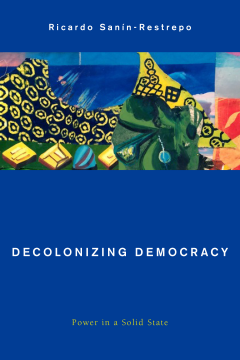
Additional Information
Book Details
Abstract
Democracy is the apparent motor of globalization, binding together ideas and institutions such as citizenship, human rights, race, the free market, multiculturalism, development, politics and the economy. This book looks to overturn this dogma and demonstrate that ‘liberal’ democracy in fact encrypts and naturalizes the horrors of capitalism and of coloniality, while denying true or radical democracy, principally through constitutions and constitutional theory.
Ricardo Sanín-Restrepo turns to the colonized, the marginalized, the creolized, and creates two novel concepts of politics, the “hidden people” and the “decryption of power” to reach a politics through and of radical democracy. The book shows that democracy is the only space of proper politics and the essential opposition of colonization and power as potestas. Sanín-Restrepo connects post-structuralism, subaltern studies, critical legal studies, de-colonial studies and Caribbean thought to muster the necessary theoretical tools to propose new grounds to decrypt the semblance of democracy that is liberalism and thus to demonstrate that democracy, far from being the standardized rule of the majority, a simple process or an institution, is the true being in the world and of the world.
Sanín-Restrepo seeks to turn the tables on the operations of power in our world; far from accepting the dominance of the oppressive system of state capitalism due to its very tangible presence, he seeks to point out the tangibility of that which opposes it and which can fight its fire with an immanent fire of its own.
Ricardo Sanín-Restrepo is a member of the Caribbean Philosophical Association and a professor of legal and political theory at several institutions across Latin America, including Universidad Autónoma de Mexico (UNAM), Universidad Central de Quito, Universidad San Luis de Potosí (Mexico), PUC Rio de Janeiro, and Universidad Javeriana in Colombia, among others.
Sanin Restrepo´s work gives us a thoughtful and innovative account of how democracy - “as the only conceivable space of politics” - is occluded by coloniality. For those interested in the decolonial perspective, this book is of paramount importance and a long-awaited contribution which introduces democracy to the debate.
Fernanda Frizzo Bragato, Professor of Human Rights and Coordinator of the Law Graduate Program at Universidade do Vale do Rio dos Sinos, Brazil.
Sanín-Restrepo argues that the key to a better, non-culturalist notion of difference lies not in the types of atoms that make up language/society, but in their arrangement. A more hopeful and conscious politics requires integration into a whole in which feedback creates differentiation, with all parts affecting one another. Domination seeks to turn our linguistic-performative political powers into a simple feed-forward mechanism. The latter gives us simulated democracy. In this fascinating book Sanín-Restrepo invites us to rise against it, like Neo and Trinity do in The Matrix.
Oscar Guardiola-Rivera, Reader in Law and Political Philosophy, Birkbeck College, University of London
Table of Contents
| Section Title | Page | Action | Price |
|---|---|---|---|
| _GoBack | 1 | ||
| _GoBack | 19 | ||
| _GoBack | 47 | ||
| _GoBack | 71 | ||
| 74 | 90 | ||
| 75 | 90 | ||
| 76 | 90 | ||
| _GoBack | 115 | ||
| _GoBack | 215 |
